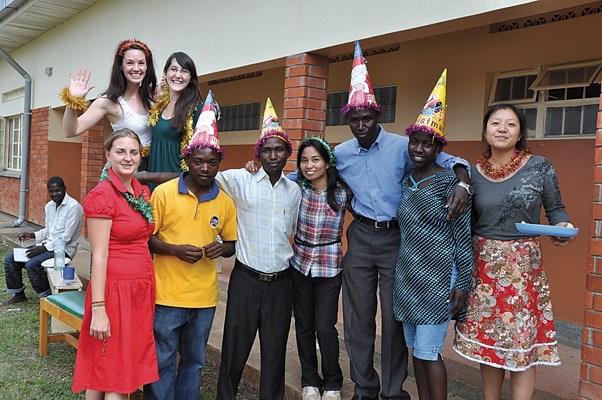The inside of a Ugandan psychiatric ward isn't a place most Canadians would ever even contemplate.
But New Westminster resident and Douglas College grad Laura Richard spent six months interning in one.
Richard was part of a contingent of Douglas grads that travelled to Uganda last October for internships sponsored by the Canadian International Development Agency.
For six months Richard worked in the mental health inpatient ward at Masaka Regional Hospital looking to help people with schizoaffective disorders, bipolar, depression, anxiety and personality disorders.
While she concedes the hospitals and practices don't quite match what she is used to Canada, Richard said Western assumptions about mental health in Africa probably aren't correct.
"You might wonder what mental health is like there and what the facilities are like, but their system is more developed than you might think," she said.
And things are changing quickly. The trip was something of a homecoming for Richard.
She did a two-and-a-half month practicum in Masaka as part of getting diploma in community social services from Douglas College in 2008.
"When I first went, the inpatient ward was just a little two-room facility. Now it's a large, large facility. That was very interesting coming from the initial tworoom place that was overcrowded and not very sufficient for the needs," she said.
But cultural ideas about mental illness are decidedly different.
Richard said Ugandans are likely to first see a local witch doctor than a medical doctor - especially when it comes to mental illness.
"It's different in the sense that people believe that it may be a curse or the result of something evil, whereas here, we have more of a grasp of it being more scientific - biological and environmental," she said. "Most of the time people seek out traditional healers first and then when people realize, 'Oh, this maybe isn't working for me,' then they come to the psychiatric unit. There's still a lot of stigma around mental illness and it's not that well understood in the villages."
Richard said she was able to help fill "gaps" in the clinical
care patients received at Masaka.
"I would come and talk with (the patients) and help with dispensing medication and I would play cards or do rehab focus activities with patients because there's not those kinds of programs at the hospital I was at," she said. "A lot of the time, there was just patients sitting in bed, lying around, not having much to do."
Asked if she feels she made a difference, Richard becomes pensive.
"I've thought a lot about it," she said. "It was those individual experiences where I know I made a difference but as a whole, it's hard to measure or quantify in some way."
But whether her six months left a mark on Ugandan mental health or not, Richard has come home with the satisfaction of knowing she was able to give back to a people who showed her great openness and warmth when she was just a student.
"I felt the first time I went, it was a lot of me learning and me taking from the people there and I wanted to be able to reciprocate that," she said.
Richard is now preparing to return to school to pursue a degree in social work.
She said she encourages anyone who wants to broaden their experience to look for opportunities in the developing world.
www.twitter.com/brent richter



